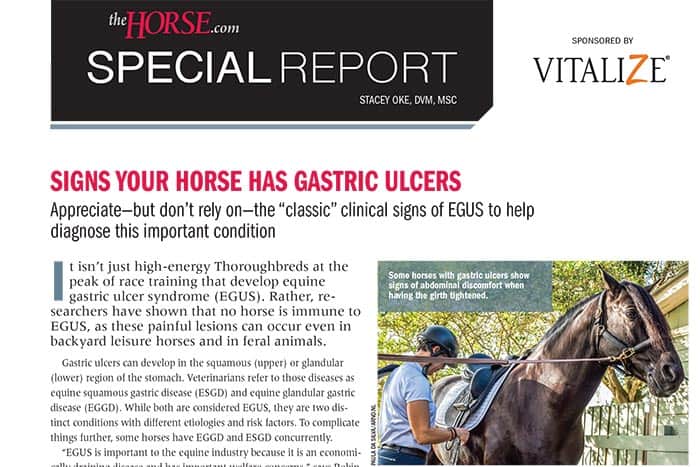
Equine Innovators: Does How You Manage Your Horse Farm Make Sense?
Dr. Steve Higgins of the University of Kentucky optimizes daily barn tasks for efficiency, cost savings, and environmental soundness.

Dr. Steve Higgins of the University of Kentucky optimizes daily barn tasks for efficiency, cost savings, and environmental soundness.

Jessica Gould, DVM, of Hagyard Equine Medical Institute, explains how extracorporeal shock wave therapy works and what cases she treats with it.

Feeding your horse forage before a ride can protect the stomach from splashing gastric acid.

Feeding your horse extra calories can add unnecessary energy, making them ‘hot.’

The quality of hay can create a hay belly.

Nutritionist: Soaking beet pulp helps with hydration, but dry beet pulp is also typically safe to feed some horses.

Learn about common upper airway problems in horses and how to address them in this visual guide.

Many horses diagnosed with equine gastric ulcer syndrome via gastroscopy have no clinical signs, or the signs are so subtle owners fail to recognize them. Sponsored by Vitalize.

Does alfalfa make horses “hot”? Should they not eat before exercising? Many of our feeding practices are based on tradition, but what’s really best for our horses?

Dr. Sarah Colmer shares how EPM recovery might vary among horses based on the severity of the disease.

EPM can be difficult to diagnose. Dr. Sarah Colmer explains how veterinarians use a neuro exam, bloodwork, and cerebrospinal fluid to confirm an EPM diagnosis.

Watch for early, subtle signs of pituitary pars intermedia dysfunction (PPID, formerly equine Cushing’s), and pursue bloodwork to see if intervention is needed. Sponsored by Boehringer Ingelheim.

Dr. Sarah Colmer shares management practices and preventive measures horse owners can implement to protect horses from EPM.

Dr. Sarah Colmer of the University of Pennsylvania’s New Bolton Center describes this neurologic disease and how horses contract it.

Do you have an itchy horse? Learn more about insect bite hypersensitivity with our visual guide.

Do you have an itchy horse? Learn about 6 possible causes of pruritus in this visual guide.
Stay on top of the most recent Horse Health news with
"*" indicates required fields